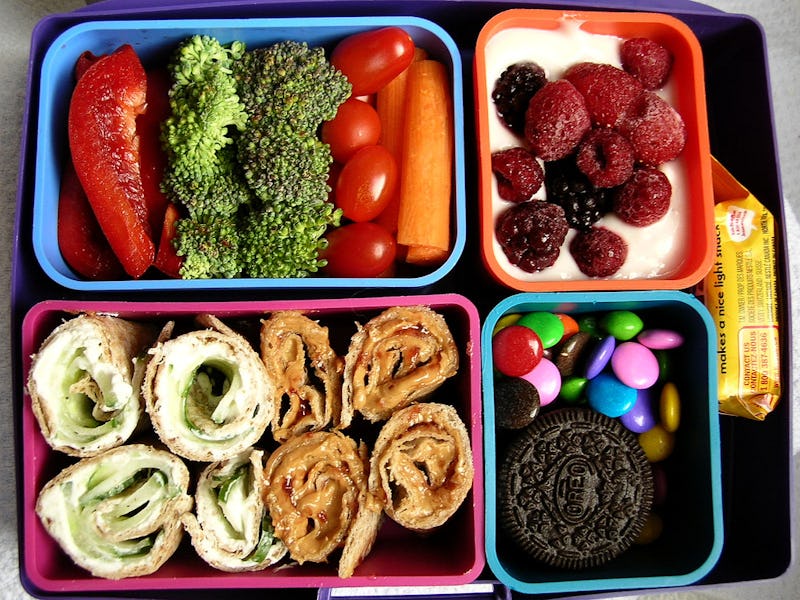Should You Skip Lunch in Favor of Snacks?
The middle meal is an outdated tradition.

You don’t have enough time to sit down for a meal in the middle of the day, but if you tell your colleagues you’re skipping lunch, they’ll likely ask you what’s wrong. Let me help you answer that question for good: Lunch is a vestigial outgrowth of the industrial revolution with no scientific import. No one needs lunch and a lot of us don’t particularly enjoy it.
Don’t get me wrong, going hungry isn’t a good idea. I’m proposing, instead, replacing lunch with a series of afternoon snacks. And not chips and cookies and soda — though some of that too — but diverse snacks that could form a meal if push came to sit-down shove. The reason this system works is that you can enjoy munching assorted nuts, fruits like apples and grapes, cold vegetables like carrots and celery, hard-boiled eggs, yogurt, protein bars, smoothies and blended drinks, and even small candies and chocolates. These foods were meant to be munched. There’s more pleasure in this continuous stream of nibbles than in a hastily consumed sub.
It’s worth noting that the reasons we eat meals in the first place are not well-understood. Humans are the only animals to separate their food intake into specific blocks at certain times in the day. It’s not natural, but as Indiana University anthropologist Rick Wilk points out, “we haven’t been natural for two million years.” By way of explaining snacking behavior, Wilk points to how mothers from different cultures feed their children based either on a schedule or cravings. Both methods seems to work.
Heather Leidy, a nutritionist at the University of Missouri, believes the main reason Americans separate their food into meals stems from the work/school environment.
It appears to be more of a practical need than anything else as it’s much easier to have a large meal and then work for four to five hours than to try to eat and work at the same time.
This makes sense for breakfast, but is there more of a trade off in the middle of the day, when time is valuable?
Abigail Carroll, a food historian from Vermont who has taught in the Gastronomy Program at Boston University and is author of Three Squares: The Invention of the American Meal, says lunch was a unique invention of the Industrial Revolution. Europeans had long been practicing three meals a day — all of them hot dishes — and brought this over to the New World in the 1600s. “In an agricultural society,” says Carroll, “it made sense to have your main meal in the middle of the day [dinner, before supper]. You’d get up early to prepare it, and have it during daylight, and you’d be pretty hungry by then anyways. People were eating dinners as early 11 AM.”
But starting in the 1800s, when people began working in factories, it was near impossible to find the time to get home and have your meal before going back to work. “They would have to find a way to eat where they are,” says Carroll. “It’s the beginning of a distinction between residential and commercial districts.” The meal truck (or meal cart) was born. And that business model only expanded as the working class became increasingly sedentary and clock oriented. Lunch became more of a way to break up the day than to stay energetic.
“Lunch becomes an accommodation to the industrialized, urban lifestyle and dinner becomes a more evening meal, where the family comes together and actually sees each other and catch up,” Carroll explains. “Because dinner becomes special, there is no pressure on lunch to become special.”
Thus the reason why we see lunch as such an informal thing these days. And it’s why lunch is now dominated by cold sandwiches, leftovers from last night’s dinner, and whatever else is easy to whip up on the fly.
Which is all to say that lunch has become a poorly practical consideration, an outgrowth of unfulfilling work and bad breakfasts. In a sense, my tendency to snack instead of meal (let’s make it a verb) is the next step in a logical evolution toward individualistic and casual dining. Next stop Soylent.
And still, there are concerns as to how ditching lunch for snacks could exacerbate some of the negative effects of work cultures — specifically for Americans. Wilk is concerned that snacking could cause more office workers to plunge even more hours at work rather than taking much-needed breaks. That’s great for companies but not necessarily great for people. He’s also concerned about breaking habits. “Our bodies are trained to expect food at specific times,” he says. And who wants to disappoint their own stomache?
But if there’s one inarguable fact of human digestion, it’s that we’re a flexible lot. Whatever we want to do, we can pull it off. For some of that — those of us who would just as soon be doing our work — snacking is a solution. For others, it’s a way to break up the day. Just don’t expect that norm to remain normal forever.